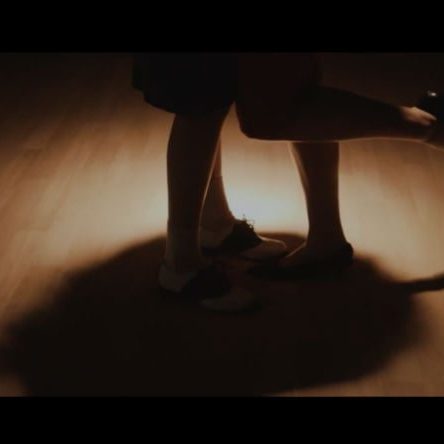 After dusk, on a remote Swedish island, Mia (Ruth Vega Fernandez) and Frida venture into the forest.
After dusk, on a remote Swedish island, Mia (Ruth Vega Fernandez) and Frida venture into the forest.
Their breath becomes slow and quiet as a herd of wild deer gather, awaiting the pair’s inevitable union.
The chemistry becomes excruciatingly heavy with faint electricity hanging in the cold air as Mia trembles, gravitating toward the other woman in the dark. When their lips finally meet, Mia’s lingering kiss leaves something to be desired… the rest of Frida.
Alexandra-Therese Keining’s Kiss Me (2012), also known as With Every Heartbeat and Kyss Mig (in Swedish), captures the formidable tension between two soon-to-become step-sisters and the inevitably torrid affair that ensues. This is not an example typical of the slim pickings of lesbian cinema.
Firstly, gender is a mere footnote here and secondly, the women are stable and not devoted to drugs, or drama. Kiss Me is a sparse and engaging film that is both absorbing and socially conscious.
Mia is soon to be married to Tim (JoakimNätterqvist), a sensitively rugged Swede, whilst her distant father, Lasse (Krister Henriksson), seeks her blessing on his marriage to Frida’s mother, Elizabeth (Lena Endre). The two (thirty-something) women first encounter one another at their parents’ engagement party where they exchange lingering glances excessively.
Of course, pesky familial dynamics result in the increasingly uptight Mia being forced to spend time with bohemian Frida in the Scandinavian wilderness. With all the comforting Swedish adornments that you would expect from such a film, and more Nordic sweaters than you could shake a knitting needle at, Kiss Me laments the complexities of love and the fluidity of sexuality as love collides with life and family expectations.
Fernandez and Mjönes give nuanced performances as the angst and longing of the two characters become visceral and palpable. The film is unhurried, well crafted and captures the sensuality of letting the body love what it loves, whilst Mia is pushed to the edge – precisely where she needs to be. While we are made fully aware of the infidelity, Keining coaxes us to empathize with the couple– they’ll not be the last ones to commit crimes of passion.
There is a strong sense of optimism that underscores these all-to-often-bleak themes – a welcomed diversion from the frequently disheartening doldrums of lesbian cinema. Kiss Me is superbly shot, warmly humorous and an honest-to-goodness lesbian drama with an abundance of mood and ambience that bring to mind pure, unadulterated ‘hygee’ (Danish term for coziness). An enchanting score by French acoustic musicianMarc Collins, singer-songwriter José González and Swedish pop icon, Robyn, is the icing on this sumptuous Swedish pastry.
If you are hostile to English subtitles and/or the soft and tranquil lull of a Swedish accent, then you may want to avoid this film. However, for those with a penchant for European language and landscape, your thirst will be suitably quenched as the saga unfolds in not only Sweden but Denmark and Spain. Awarded the best breakthrough prize by the American Film Institute, this film has been hailed as an international success.
I would say that Kiss Me is a timely example of classic lesbian filmmaking, but it’s not – it’s better. For many of you, this film will be so far up your street that it will knock on your door and let itself in.


